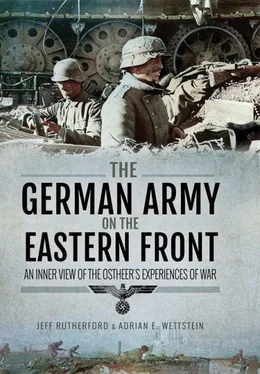We know therefore, what we are fighting for and thus we will win. Especially on 30 January, we want to remember therefore what we all owe to our Führer. He has always led us upwards, Germany again stands powerful. And as we thank our Führer, we want to pledge that we will stand firm together, to do our duty and to gather all of our forces for the offensive. [30]
Long live the Führer and the Greater German Reich!
Several important themes emerge from this order of the day. First, while it fails to display the virulent anti-Bolshevik ideological slant that permeated similar directives, it does nonetheless advance other Nazi beliefs. The commander points to the ‘radiant future’ that all Germans would enjoy following victory; this pointedly contrasts to the ‘unemployment and hunger’ that reigned in Germany following its defeat in the First World War and the loss of territory, resources and people to the ‘robber-states’ that emerged following its conclusion. [31]He credits Hitler for Germany’s revival and, by emphasizing his leadership during the winter crisis, he explicitly emphasizes his confidence in the Nazi regime. Second, while ‘international Jewry’ is blamed for aligning the United States and the Soviet Union against the Third Reich; the 126th Infantry Division commander’s order thus reinforced Nazi anti-Semitic claims. Finally, he paints the war waged against Germany as one designed to keep the Reich in a subordinate position. With the support of its numerous allies, however, the German army could indeed achieve a just victory. Once again, the phrase ‘to be or not to be’ emerged in a German order: for the army as an institution, the war – especially that in the east – had become a war of existential struggle. At its most basic level, the order was an attempt to convince his men of the bond between army, society and Hitler, in hopes that this would keep them in the field fighting for final victory.
Such directives were meant to assuage the doubts that had begun to creep into the minds of German soldiers across the front. One man wrote to his wife in late January 1943 that:
Now the highly anticipated speech of Göring is over and we know quite well what we can expect from the future that means: nothing more. From the outset, every soldier must be prepared for self-sacrifice [ Opfertod ] and to expect it. Should one really be ‘lucky’, one can count on being regarded as a fool after the war. In any case, we weren’t 100% enthusiastic about the speech. Naturally, everyone possesses a full appreciation of this struggle of destiny and is continually ready to die for it – but why must this be said to the Heimat in such a crass way? Well, that the war will still last for a long time, will not shake us further. This is what we have long expected!. […] This crisis must first be survived! [32]
Despite the evident war weariness expressed in this letter, the writer also maintained a steadfast approach to the war: he would stay in the field and do his duty until death. The morale crisis engendered by the defeat at Stalingrad was only exacerbated by the increasingly heavy bombing of German cities during the course of 1943. Soldiers at the front were frustrated and angered by both the suffering of their families and the state’s inability to protect them. The previously cited NCO from the Caucasus wrote:
The fearfulness of war time events is now perhaps even clearer than in 1914/18, because now the civilian population is very severely suffering. Hamburg, Nuremberg, [and] Munich were affected in recent days. If a settlement with England isn’t reached this year, then all the great cities of the north and west will lay in rubble. In addition to the loss of cultural values, it also means a misery for the civilian population, that we haven’t experienced all the way back to the Thirty Years War. This is Judas’ revenge, without a doubt! [33]
Another soldier wrote a letter to his sister in which he expressed his worries about the bombing of Germany, but also clearly articulated his belief that Germany needed to continue the fight to the end. [34]
My comrade from Hamburg received mail. Everything is OK. He apparently lives in one of the 180 houses that are allegedly still standing. Having said this, his wife wrote that she couldn’t leave her cellar for days 1. because of the heat and 2. because of the continual attacks. All rail stations are destroyed. It is said that no street was spared but the first impression is always worse than the impression one gets once the clearing work has ended. A man returning from leave in Mainz said that while the attacks were continual to be sure, the resulting damage wasn’t so considerable. A person returning from his leave in Cologne said the same thing. So there is certainly much exaggeration. The mood is nevertheless catastrophic. I understand this quite well, but I am nevertheless against the slogan: peace at any price!
The people should say what they want and where they want to go and not simply push for senseless mutiny. If this war does not bring a rational decision about the future of Europe, then there will soon again be a new war, because I do not believe that America or England can bring about a better economic or social order for us that will have value for a long time. In any case, I see a truly black future. I can’t imagine at all what a peace should look like. Our enemies are in that respect certainly not united, for neither will the Russian give up their aims, nor the American or English concede anything to him if it threatens their interests. We can make use of this if we tip the scales. Perhaps you now understand what I want and why it is that I don’t see the situation as so hopeless, if we were to just once display a united political will and choose any direction for us and didn’t always want to force through our own ideas, even if by doing so we make the entire world our enemies. Germany is forced by its position to play a role in politics, but we can only have success when the Volk politically thinks and acts. In politics, one cannot go through the wall with his head, but rather must twist and turn, lie and cheat, even when it goes against character. If the Volk does not see this and act today, then there will be no happy future. Then it will always be the whipping boy and have fairly earned it. This petty bickering and agitation which are now being pushed I can only curse. We must evaluate everything that happens today and tomorrow, not only for the moment, but above all for the future.
Even when faced with a deteriorating situation at the front and at home, however, the ranks of the German army continued to tenaciously fight against the Red Army. Various factors played into the maintenance of German morale and combat motivation, including primary group bonds, unit cohesion based on regional recruitment, a professional commitment to the army and its values, and the increasing importance placed on Nazi ideological beliefs. The latter was due in large part to the introduction of ‘military-ideological care’ in mid-1942. [35]This new programme amounted to ‘the indoctrination and manipulation of the soldiers’ [36]with Nazi values, beliefs and fears being used to motivate German soldiers at the front. An order issued by the 8th Panzer Division’s welfare officer in late October 1943 highlights this approach. [37]
The German Struggle and Victory against Soviet Slavery
Comrades! Once more, we know what is in store for us after the war if it doesn’t end with a German victory.
The British union big shot Sir Herbert Ingram published a letter in the London newspaper ‘Daily Telegraph’ in which he declared with satisfaction that the Soviets
‘after the war will transport all German men up to 25 years old to forced labour in the Soviet Union and during this time period, the entirety of Germany will be occupied by the Bolshevik army.’
Читать дальше






![John Stieber - Against the Odds - Survival on the Russian Front 1944-1945 [2nd Edition]](/books/405234/john-stieber-against-the-odds-survival-on-the-russian-front-1944-1945-2nd-edition-thumb.webp)





